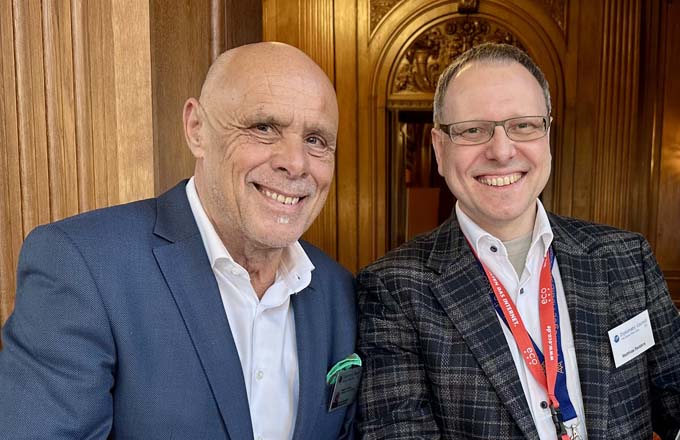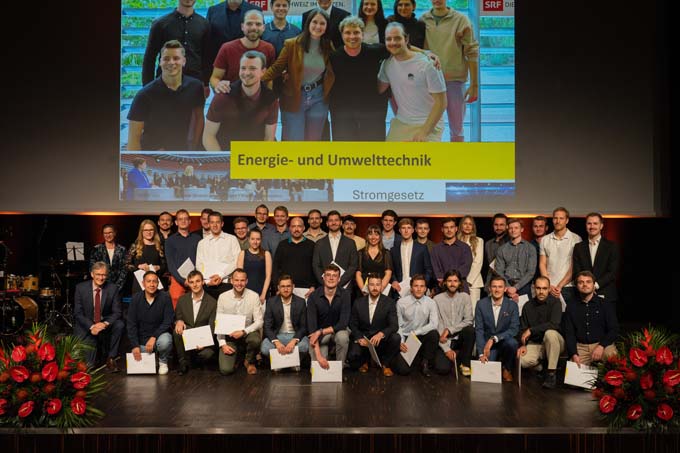Experts see quantum technology on the rise
According to experts from the Diplomatic Council, a non-governmental organization consisting of a global think tank, a worldwide business network and a charity foundation, quantum technology is on the rise and is likely to be the next technological revolution after AI.

Everyone is talking about artificial intelligence, but the next technology of the future is already in the starting blocks. "While all eyes are currently on artificial intelligence, the next technology revolution is already in the pipeline with quantum computing," explains Harald A. Summa, Chairman of the Quantum Leap initiative of the Diplomatic Council, a think tank with advisory status at the United Nations. "It is high time for operators of data centers, cloud services and messaging services in particular to integrate quantum technology," adds quantum technology expert Matthias Reidans from Rosenberger-OSI (Optical Solutions & Infrastructure), which is involved in the initiative.
AI plus quantum technology will provide a performance boost
Harald A. Summa explains: "Quantum technology is rapidly emerging from research and development laboratories and penetrating the economy. As with AI, all sectors will be affected by this sooner or later. The combination of AI and quantum computing will result in performance boosts that are still difficult to imagine today, some of whose effects can only be guessed at."
Quantum technology works with charge patterns of ions or photons that can simultaneously "process" changes of state in the sense of programming. Microwaves or lasers are used to encode so-called "qubits" as the smallest units of information. This functional principle enables quantum computers to perform a large number of calculations simultaneously, which leads to an exponential acceleration of computing power far beyond the performance level of conventional computers.
Quantum-resistant data encryption urgently needed
According to the initiative, the area most affected by quantum technology in the short term is data encryption across all sectors. The reason: quantum computers are capable of cracking conventional encryption within a very short time. This would open up the databases of companies and government organizations to cyber criminals and intelligence services in one fell swoop. "Cyber gangs are already capturing huge amounts of encrypted data online in the expectation of being able to decrypt it in a few years or even months," says quantum technology expert Matthias Reidans.

"Every data center is well advised to offer its customers quantum-resistant encryption as quickly as possible," explains Harald A. Summa. According to him, this also affects data transmission for messaging services, for example. He points out that Apple has already developed so-called post-quantum encryption for its iMessage service. The Quantum Leap boss points to the possibility of photon-based key distribution via satellite: "It is conceivable that billions of keys could be distributed via satellites in the future to ensure the security of the quantum world." In the next few years, hundreds of satellites equipped with photon transmission modules will reach orbit.
Quantum as a Service
The operators of data centers and cloud services should also react quickly to the new challenge, warns Harald A. Summa. He explains: "Data centers will be the home of quantum computing. In the first step, quantum computers will not be installed everywhere, but the majority of quantum power will be obtained from the cloud, i.e. data centers." Matthias Reidans adds: "It's about upgrading high-performance data centers with quantum computer modules."
Harald A. Summa outlines the future: "Quantum computers will act as a kind of turbocharger for existing high-performance computer-specific applications and unleash further innovative power, particularly in generative AI. As quantum as a service, they will be available in the cloud to a wide range of users."
The new Quantum Leap initiative in the Diplomatic Council therefore offers data center operators the opportunity to exchange ideas in a pre-competitive circle about which steps make sense in order to prepare for quantum technology, says Chairman Harald A. Summa, explaining the think tank's advance.
Quantum computers are useful from 1,000 qubits upwards
According to Quantum Leap, it is currently difficult to predict how quickly this innovation cycle will gain relevance. According to Matthias Reidans, this point in time is imminent. He points to developments at European manufacturers such as IQM, AQT and eleqtron, some of which are already able to supply stable, high-performance quantum computers at affordable prices, and to further technological breakthroughs in the USA, China and Canada. "Quantum computers reach their decisive performance level from around 1,000 functional, i.e. logical and controllable, qubits," says the Rosenberger OSI expert. He adds: "The first devices of this kind can be expected this year or next."
The expert vehemently disagrees with the preconception that quantum computers require extremely cold environments to operate. He says: "You can already buy quantum computers that work at room temperature. They can be operated in ordinary data centers in the 19-inch format that is common there." Matthias Reidans points to the companies Alpine Quantum Technologies (AQT) from Innsbruck and the German-Austrian start-up Quantum Brillance as examples, both of which are pursuing the approach of enabling integration-uncomplicated implementations. The quantum technology expert is also aware that standardization efforts in this area are underway worldwide.
Quantum sensor technology in medicine
It is important to Harald A. Summa to emphasize that quantum technology means much more than "just" dealing with quantum computers. This technology also enables a quantum leap in sensor technology in the truest sense of the word. For example, the computer tomography (CT) and magnetic resonance imaging (MRI) methods commonly used today to look inside the human body could be replaced in future by quantum sensory methods, which would enable much better and therefore more meaningful imaging.
Source and wFurther information: www.diplomatic-council.org/quantumleap









